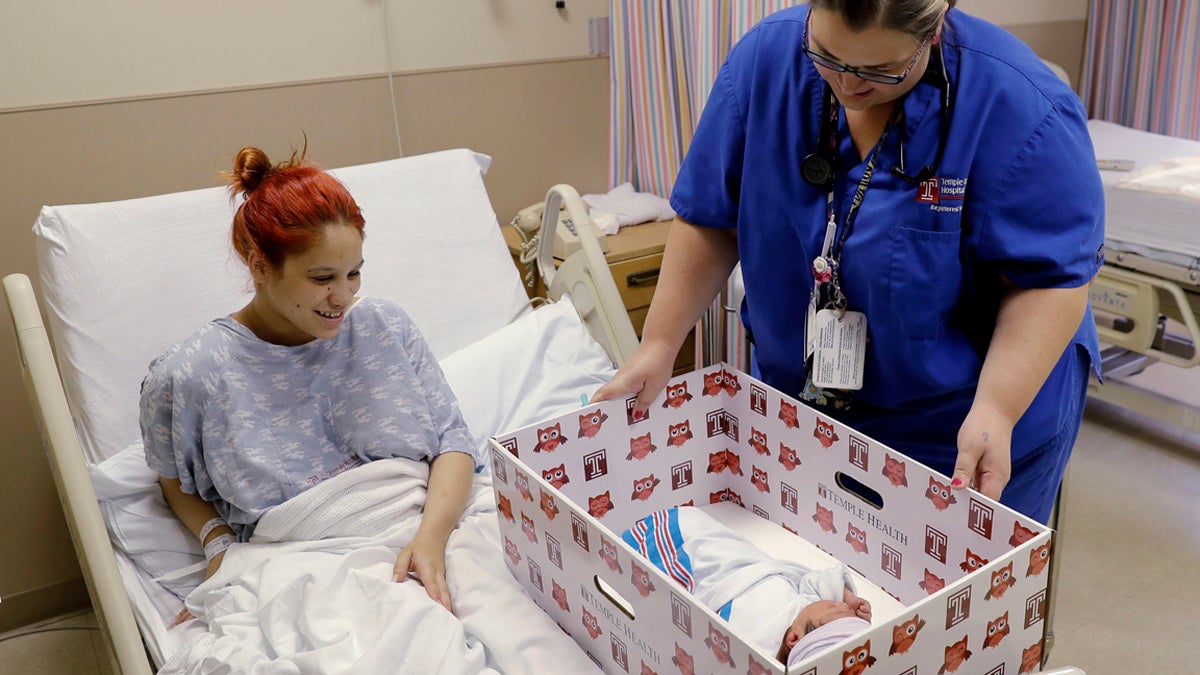New Jersey ‘baby boxes’ aim to reduce unexpected infant deaths

In this May 6, 2016, file photo, Keyshla Rivera smiles at her newborn son Jesus as registered nurse Christine Weick demonstrates a baby box before her discharge from Temple University Hospital in Philadelphia on Friday, May 6, 2016. (Matt Rourke/AP Photo, file)
New Jersey is rolling out an unusual health initiative aimed at curbing infant mortality: providing all new parents in the state with a free “baby box.”
It is a laminated cardboard box the size of a mail carrier with a snug, fitted mattress inside.
Simple, but effective in promoting safe sleep, according to Kathie McCans, a physician at Cooper University Health Care who also chairs the child fatality and near fatality review board for the state.
“The fact of the matter is, buying the most expensive fancy crib and having all this cool bedding makes it look pretty, but it’s not safe,” McCans said.
Sudden unexpected infant deaths can involve what is known as “accidental overlying” when a caretaker rolls over on a baby. Babies can also suffocate if they are not able to clear away from an object or get stuck in a poorly-fitted mattress or couch.
McCans more or less defines a safe sleeping space as one that is free of pillows, blankets or other items that could obstruct babies’ airwaves. The American Academy of Pediatrics has long recommended babies sleep on their backs.
In 2014, 57 New Jersey babies died from causes related in some way to sleep, according to the most recently available state data.
“And of those 57, the majority of them didn’t meet these best practices sleeping guidelines,” said McCans, whose board reviews the details of all of New Jersey’s infant mortality cases. “Even one baby dying in a way that could be preventable is too many.”
New Jersey rolled out the statewide baby box initiative last month in hopes of addressing the problem. All of the roughly 100,000 moms expected to give birth in the state this year will receive one.
Cooper University Health Care is the first site to start giving them out. More places are registering as distribution sites. Meanwhile, new parents can either pick up a box or have one delivered to their home after watching a series of online videos about preventing infant deaths.
“My hope is that by providing this education in a format that’s acceptable and accessible to those becoming parents today, that we’ll change the culture of what people think is okay for baby sleeping,” McCans said.
Although similar initiatives are underway elsewhere in the country, New Jersey’s appears to be the most ambitious. The idea stemmed from a popular baby box program in Finland and a smaller one that launched at Temple University Hospital in Philadelphia last spring. There, the hospital used the boxes as a “replacement gift” for the formula bag staff members stopped providing to a new mom before leaving the hospital. The formula ban came out of Philadelphia’s campaign to encourage breastfeeding.
Megan Heere, medical director of the Well Baby Nursery at Temple University, said researchers there had also identified specific risk factors for bed sharing they believed the boxes could address.
“One of the protective things was education in the hospital,” she said. “And higher rates of bed sharing happened if mom didn’t have an identified place for the baby to sleep.”
Temple’s boxes contain some goodies and are valued at about $90 each, said Heere. The hospital plans to distribute about 3,000 of them, thanks to funding from several non-profit sources and the hospital itself. Heere also plans to study their effectiveness, but anecdotally has found that moms are using them.
McCans didn’t have the specific financial breakdown for the New Jersey initiative, but she said it is being funded through a $40,000 federal grant and through the company that manufactures the boxes.
Even though the box may seem cute, McCans said the effort really isn’t about the actual box. It is about education and prevention.
“We don’t really care where you put your baby to sleep, whether it’s in a baby box or crib or bassinet, so long as you do it in the safest way possible: which is a firm mattress with a fitted sheet; no bumpers, no pillows and no stuffed animals,” she said. “And putting the baby to sleep on their back in the same room as the parent, but not on the same sleep surface.”
WHYY is your source for fact-based, in-depth journalism and information. As a nonprofit organization, we rely on financial support from readers like you. Please give today.

